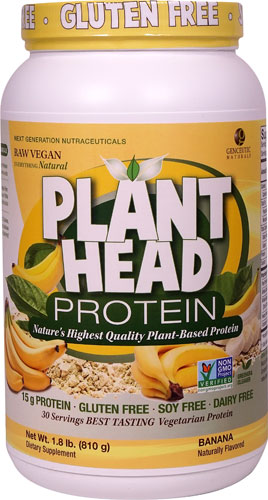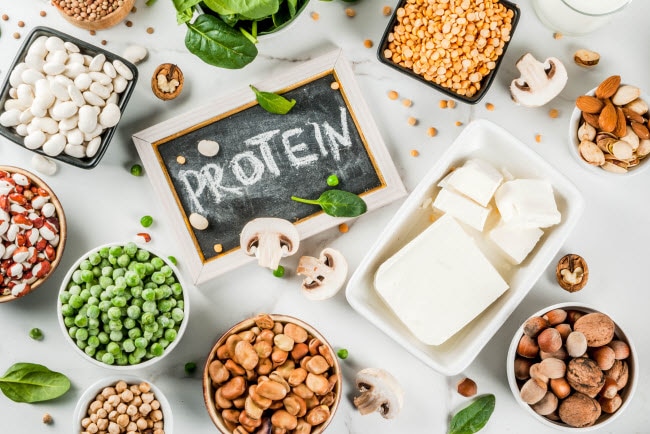More and more people have a beef with red meat. Sure, it’s a valuable source of protein — a 3-ounce serving of the leanest ground beef delivers 18 grams of protein. But it’s also a source of potential health problems; research ties red meat to a heightened risk of heart disease, diabetes and some cancers.
Therefore, Americans are seeking protein alternatives. That’s where plant proteins come in. According to a 2019 survey by the International Food Information Council Foundation, nearly one-fourth of U.S. consumers said they’d stepped up consumption of plant protein in the previous year.
So, if you hope to rely more on plant proteins, how do you know which ones to pick? What are their pros and cons? In this guide, we’ll review some of the common types of plant proteins and explain what some of the key differences are. First, here’s a rundown of some of the most significant sources of plant protein.
Plant Protein Sources
Legumes
- 1 cup of boiled lentils, 18g
- 1 cup of cooked edamame, 17g
- 1 cup of peas, 8g
- 1 ounce of peanuts, 7g
Nuts
- 1 ounce of almonds, 6g
- 1 ounce of cashews, 5g
- 1 ounce of walnuts, 4.3g
- 1 ounce of hazelnuts, 4.2g
- 1 ounce of pecans, 3g
Seeds
- 1 ounce of sunflower seeds, 6g
- 1 ounce of flax seeds, 5.2g
- 1 ounce of pumpkin seeds, 5g
- 1 ounce of chia seeds, 4.7g
Grains
- 1 cup of cooked quinoa, 8.1g
- 2 slices of whole wheat bread, 7.2g
- 1 cup of cooked wild rice, 7g
- 1 cup of cooked oatmeal, 6.1g
- 1 cup of cooked buckwheat, 5.7g
- 1 cup of cooked long-grain brown rice, 4.3g
Vegetables
- 1 cup of cooked artichokes, 5.8g
- 1 cup of cooked sweet yellow corn, 5.4g
- 1 cup of cooked asparagus, 4.3g
- 1 cup of cooked Brussels sprouts, 4g
- 1 cup of cooked, chopped broccoli, 3.8g
As you can see, some plants pack more of a protein punch than others, meaning it’s best to mix sources of protein to reach the recommended daily intake of this macronutrient. The amount of protein you should consume each day depends on your age, gender and physical activity, according to the U.S. Department of Agriculture (USDA). To find out the level that’s right for you, visit choosemyplate.gov/protein-foods.
Protein intake isn’t the only deciding factor when choosing plant proteins, though. Other dietary concerns come into play. Here are a few of them.
Other things to consider when choosing plant protein sources
Amino acids
Amino acids play a key role in determining the quality of a protein source.
Melissa Morris, a professor of nutrition and applied kinesiology at the University of Tampa and a part-time writer for Exercise.com, explains that amino acids are the building blocks of protein. Most plant proteins lack all of the amino acids that we need to get from food, she says. However, Morris adds, you can combine various kinds of protein to obtain the proper amount of all 20 amino acids. For instance, you might eat quinoa to get the amino acid lysine and soy to get the amino acid leucine.
Nine of the amino acids are classified as “essential,” meaning your body can’t manufacture them, so you must get them from food. Animal proteins offer all nine of those amino acids, while plant proteins don’t.
Calories
When it comes to calorie counts, not all proteins are created equal. For example, beans, peas and lentils characteristically are low-calorie foods, while 2 tablespoons of smooth peanut butter supply 188 calories. This doesn’t mean you should cut peanut butter out of your diet entirely; instead, you should closely monitor how much peanut butter you’re eating to ensure you’re not going nuts.
Fat
Generally, nuts are loaded with protein. But some of them also are loaded with fat. For instance, 1 ounce of almonds has 14 grams of fat and walnuts weigh in at 18.5 grams per ounce.
Don’t let the fat in nuts deter you from including them in your diet, though. Nuts contain healthy fats and are rich in antioxidants, fiber, vitamins and minerals. Just be sure to keep an eye on your daily fat intake from nuts (or any other source of plant protein).
Fiber
Some kinds of plant protein, such as tofu, don’t offer bushels of fiber. However, beans, chia seeds, nuts and whole grains are among the myriad sources of plant protein that can more than fulfill your daily needs for fiber.
Nutrients
Plant proteins usually are chock-full of nutrients other than protein, according to Morris. For example, beans, edamame, nuts, quinoa and tofu serve up a slew of vitamins and minerals.
“Plant proteins also tend to be low in saturated fat and have no cholesterol, which are found in many animal proteins,” Morris says.




